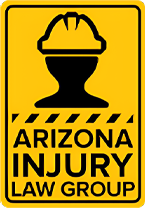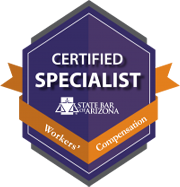Workers’ Compensation: Claim Settlement Considerations

Compromise and Settlement in Arizona
In some instances, you may want to consider accepting a lump sum settlement instead of receiving regular monthly payments indefinitely. You might also decide to accept a settlement instead of taking a disputed case to trial. Whatever your reason for considering a settlement, it is always a big decision. You need to make sure that you understand exactly what you will receive and what you will be giving up in return.
Things to consider before accepting a settlement offer

Don’t rush into a decision
Don’t accept a settlement offer too early in your recovery process. It is best to wait until your injury reaches a stage where the doctor is of the opinion that you are unlikely to improve any further. This is referred to as the “maximum medical improvement” stage. Until you reach this stage you will not be able to estimate the potential value of your claim accurately. You need to know the full extent of your disability. Will you have the full functioning of your body back? What are the future medical expenses, and so on?
The possible downside of accepting
- A settlement is “full and final”
In most cases, a settlement will be final, and you won’t be able to change your mind and claim more compensation from the insurance company. You may have to give up your right to any future claims for medical care for your injury unless the settlement specifically states that you may claim for future medical expenses.
- What about your future rights?
When you accept a settlement you may be required to give up certain rights. The law requires that both parties must agree to the terms, and it must always be voluntary. In Arizona, the state only permits settlements in certain situations.
Once your claim is undisputed, you cannot give up certain rights. You can settle wage loss and certain medical benefits, but the settlement can only cover benefits related to injuries known at the time of settlement. If you discover further conditions related to the injury or further injuries, you may receive further benefits. You may also re-open your medical claim after the settlement.
If the insurance disputes your claim, they may still offer a settlement amount. If you accept the offer you may have to give up your rights to any future medical treatment, or future lost wages and rehabilitation services. Consider your options carefully, before accepting.
The possible upside of accepting
- The outcome is certain
You are never guaranteed the outcome of a hearing or a trial. One of the advantages of accepting a settlement is that a settlement offer is certain. If there is a valid dispute about your injury, it might be worth discussing a settlement with the insurance company. For example, if two doctors don’t agree on your disability rating, it might be in the best interest for you and the insurance carrier to settle on a number between the two ratings.
- Inflation
Permanent disability awards do not increase with living cost, so the value of your monthly payment may decrease over time. You may decide to invest your lump sum settlement amount and receive interest. Upon your death the proceeds will remain in your estate; monthly benefit payments will end after death.
- Emotional stress
Going through the process of a disputed workers’ compensation claim can be very stressful. You might want to avoid the preparation for your hearings and all the time and energy involved going through the claims process. Settling your claim will bring the process to an end and you won’t have to deal with the insurance company any further.
The amount of the settlement
There is no easy formula to work out the full value of your claim.
You need to consider the following factors:
- The potential future medical expenses
- Medical expense to date still owed
- How much is owed to you for temporary disability benefits to date
- How much might be owed to you for future permanent disability benefits
Take note: The settlement amount cannot exceed the maximum benefits set out in the ARS.
Likelihood of success on trial
You need to evaluate the strength of your case. Is the raised dispute/defense likely to succeed on trial? Are you unlikely to succeed with your claim if you go to court? If the dispute has merit and you are at risk of losing the case, you might want to consider accepting a lump sum payment, even if it is lower than your claim.
Approving the settlement
In terms of sec 23-941.01 of the ARS, any settlement must be approved by the ICA to be valid and enforceable. Once you have reached a settlement the ICA will review your documents. The documents must set out the terms of the settlement and how the money will be paid. If the ICA is satisfied with the terms of the settlement and that you understand the terms it may approve the settlement. R20-5-120 of AAC further states that the acceptance of any payment, or the signing of a settlement agreement, shall not release the employer or the carrier from any workers’ compensation obligations unless approved by the ICA. Should the employer pay an amount to the employee under such an “unapproved” settlement agreement, the employer/carrier shall not be entitled to a credit for such an amount.
Legal advice
Accepting a settlement offer can have major consequences for you as the injured employee. Consult with a lawyer with experience in drafting settlement agreements. It is of the utmost importance that you understand your rights and the consequences of signing a settlement agreement.
Get Help Today
Call Immediately For A Free, No Obligation Consultation And Let Us Help You Put Your Life Back On Track. Let Us Help You
Regain Normalcy And Stability Again. We Want To Help You Get The Benefits You Need And Deserve!


